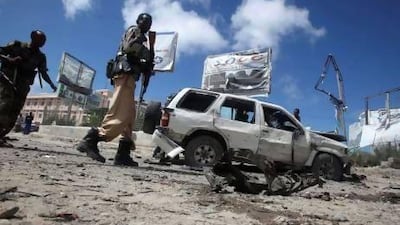MOGADISHU // A suicide bomber rammed an explosive-laden car into a convoy carrying Qatari officials through the centre of Somalia's capital Mogadishu yesterday, killing at least eight Somalis, officials said.
The visiting delegation of Qataris, who were travelling in the Somali interior minister's bulletproof vehicle, were "safe", a security officer said, without going into further detail. The minister was not in the car at the time.
The Qatari delegates are involved in development projects in Mogadishu, Somali president Hassan Sheikh Mohamud said. Qatar has been forging closer political ties with Somalia in recent years as it seeks to expand its influence in the Horn of Africa region.
The Islamist rebel group Al Shabab said it was behind the attack and threatened further strikes against Somalia's government, which it called a "puppet" of western powers.
"More explosions are on the way," Al Shabab's military spokesman Sheikh Abdiasis Abu Musab said by telephone.
The Al Qaeda-linked rebels, who want to impose their version of Sharia on the country, have kept up a campaign of guerrilla-style attacks since African peacekeepers pushed them out of bases in the city and other major towns.
Western powers, long worried Somalia would be a launch pad for militant Islam in east Africa and beyond, fear it could slide back into chaos if security forces cannot cement security gains.
The blast tore through the busy "Kilometre 4" road junction in the centre of Mogadishu's commercial and administrative district, hurling metal debris over a wide area. Nearby buildings were blackened and power cables hung loose from poles.
It was not clear in the confusion that followed the blast how many people had been killed. A coordinator for Mogadishu's emergency services said ambulances had carried away the bodies.
Earlier, the chairman of the city's Hodan district, where the attack took place, said at the blast site eight people had died.
"A silver 4x4 sped around the roundabout blaring its horn as it chased the convoy," college student Abdullahi Ismail said at the scene, nursing a gash in his forehead. "It hit the last car in the convoy."
Yesterday's bomb was a stark reminder of two decades of civil strife in a country where the central government depends heavily on a near 18,000-strong African peacekeeping force for its survival.
While there has been a significant improvement in the coastal capital since African Union troops drove the Islamist Al Shabab group out of the city in 2011, the attack showed the relative ease with which the militants can still strike.
Parts of Mogadishu were in lockdown last week after security officials received a tip-off about an imminent attack, but security was relaxed on Saturday.
The Kilometre 4 intersection connects the city's fortified airport, where the United Kingdom opened an embassy on April 25, with the presidential palace, parliament and other ministries.
The state of Somalia's security forces will top the agenda at conference in London on May 7. Britain and Somalia are hoping to use the event to drum up more international support at a time when Al Shabab are weakened as a fighting force but can still inflict devastating strikes.
Civil war after the fall of dictator Mohamed Siad Barre in 1991 left Somalia without effective central government and awash with weapons. The turmoil opened the doors for piracy to flourish in the Gulf of Aden and deeper into the Indian Ocean.
* Reuters and Associated Press

